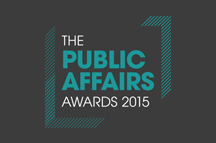Best Campaign in Scotland

Campaign: Millions for Mental Health in Scotland
The 2015 Public Affairs Awards are dedicated to celebrating the best work that the Public Affairs industry has to show. As Media Partner, PubAffairs will be highlighting the entries of finalists in a number of categories.
The below entry is Orbit Communications's submission in the Best Campaign in Scotland category.
ClientThe Scottish Children’s Services Coalition (SCSC) is an alliance of leading independent and third sector service providers. These providers have come together to work with political and other key stakeholders, campaigning to improve the delivery of children and young people’s services. Brief and ObjectivesThe SCSC tasked Orbit with devising a campaign to increase Government funding for child and adolescent mental health services (CAMHS) in Scotland. A perfect opportunity to achieve this in a fiscally constrained environment was seen as coming through the UK Chancellor’s Autumn Statement in December 2014. This highlighted that £125m (over 5 years) in additional funding would be coming to the Scottish Government as a result of the UK Budget in March 2015. The SCSC set Orbit a target to try and obtain £20m (over 5 years) of this for CAMHS and it was aimed to deliver this through a public affairs campaign involving extensive lobbying supported by media relations activity. BackgroundEstimates vary, but research suggests that 20% of children have a mental health problem in any given year, and about 10% at any one time. These include issues such as depression, anxiety, suicide, OCD and self-harm. Research and planningThe Autumn Statement in December 2014 revealed that £125m would be coming to the Scottish Government as a result of the Barnett consequentials, to be formally announced in the UK Budget in March 2015. This allowed us time to identify and engage with relevant stakeholder audiences, researched as having an obvious interest in the area. A communications plan was established that aimed to generate a series of timely parliamentary debates, parliamentary motions and questions, supported by a comprehensive media relations strategy. It also allowed time to gather case studies and evidence to highlight the high societal costs of child and adolescent mental health. Strategy and tacticsCampaigning to ensure that £20m of the £125m in additional funding coming to the Scottish Government was going to be invested in mental health services was clearly going to be challenging. Mental health provision has always been viewed as the poor relation when compared with physical health, and there were of course other increased demands, be it education, transport or housing. Through lobbying key stakeholders, building partnerships with other relevant organisations and undertaking an extensive media relations campaign our aim was to impress on the Scottish Government the clear requirement and public demand for investment in these vital services. Implementation - December 2014 - May 2015We used our research to develop a persuasive case with Government Ministers, opposition, other key influencers and the media to raise awareness of the issue and generate support. The public were also energised through a petition and extensive media relations activity. We:
Provide evidence of the distinct role and results of public affairs and lobbyingOn 24th of May, the Scottish Government announced that it would be investing £85million to improve mental health services for children and young people in Scotland over the next five years. The campaign objective, as developed with the client, was not only fully met but exceeded by more than fourfold. Measurement and evaluationOver the course of the 6 month campaign:
The overwhelmingly positive media coverage highlighted that over the course of the campaign there were over 25 million Opportunities to See, with top media sources being:
Budget and cost effectivenessFrom planning to implementation and then completion, the budget equated to £6,000, delivering £85m of funding. The campaign yielded over 25 million Opportunities to See (OTS). For every £1 spent the campaign delivered over 4,100 OTS. |












